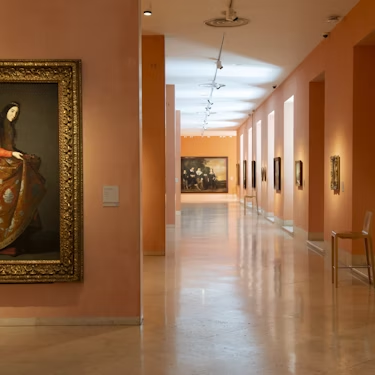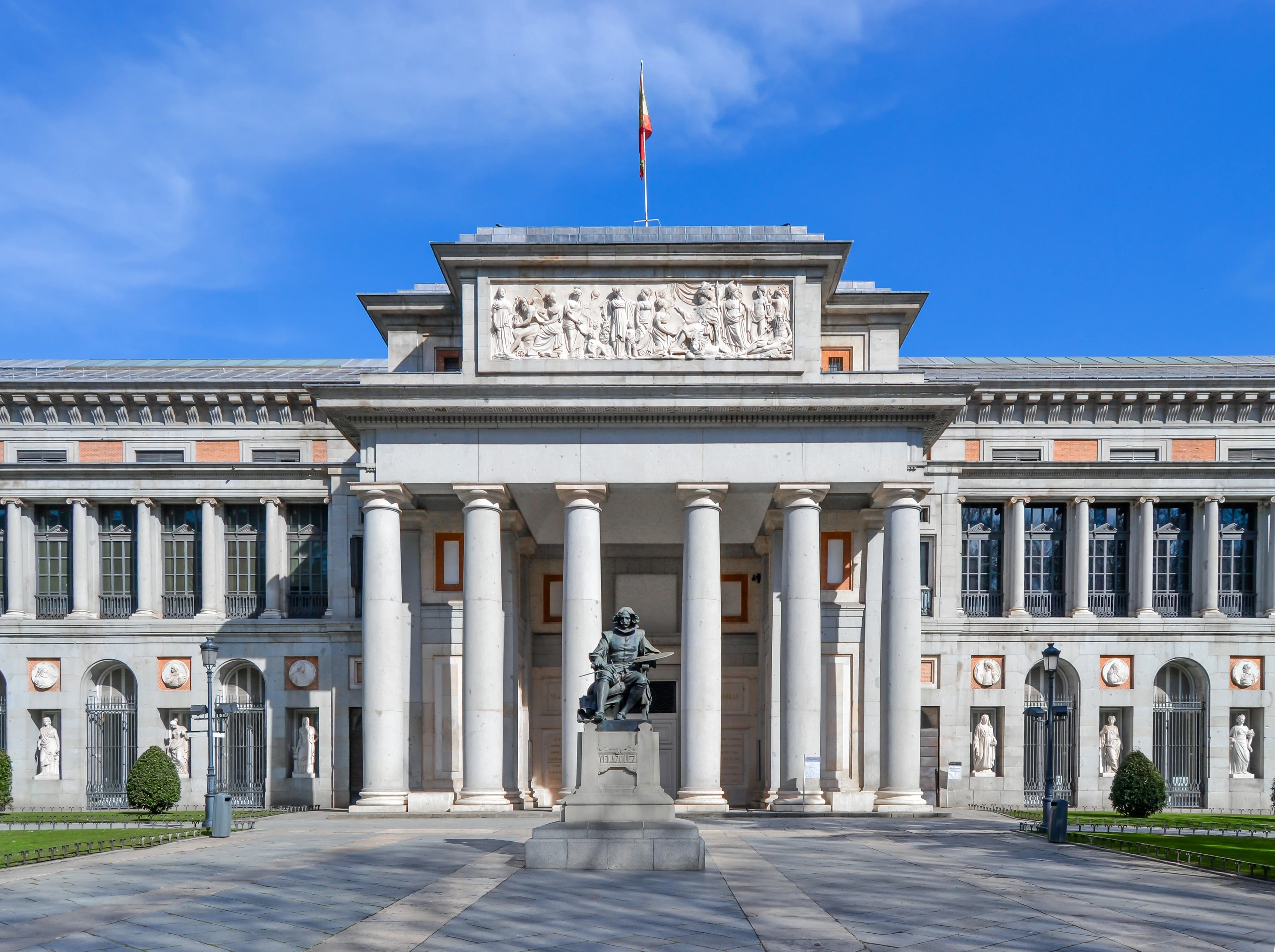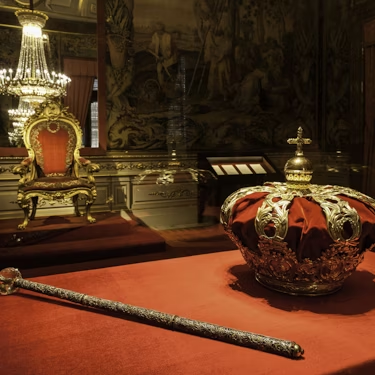More about: Madrid in 5 Days: tips, what to see, and much more
Five days may seem like a long time to spend in Madrid. However, it is a perfect stay to see everything at your leisure and, in addition, it allows you to take a couple of excursions to see some nearby places of great historical and artistic interest.
To make the most of your stay I have prepared an itinerary with the most interesting places, from its monuments to its palaces, not forgetting its parks and squares. All you have to do is let yourself go and try to make the most of it.
Day 1: Get to know Hapsburg Madrid
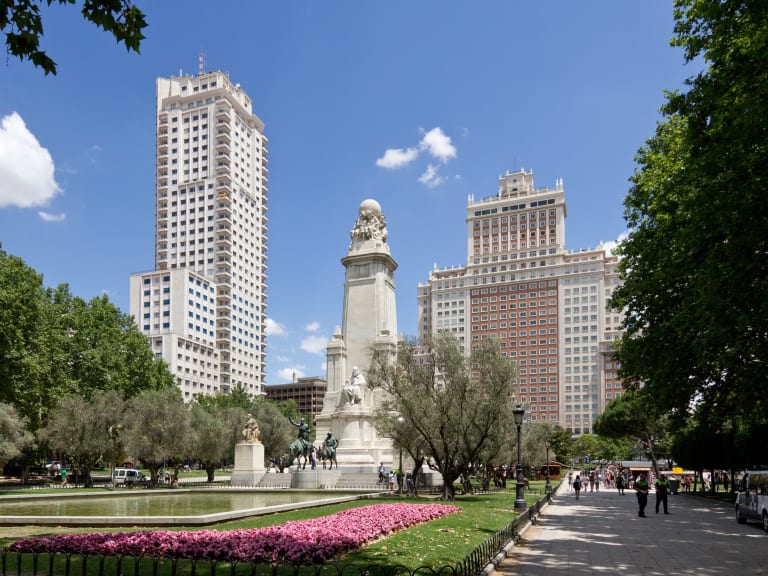
There is nothing better than starting your trip with a tour of the area known as Madrid de los Austrias, the oldest and most traditional part of the city. As the historic centre of the city, its streets are full of essential attractions, so I recommend that you walk around at your leisure while you take in each and every corner.
One option for this tour is to hire one of the organised tours that take you around the centre of Madrid This way, not only will you be sure to get to each place without getting lost or wasting time, but you'll also receive interesting information about what you're seeing.
Another option is to take one of Madrid's tourist buses. With them you can hop on and off whenever you want and it's a great way to get a first impression of the city and then complete the visits at your own pace.
Start the tour at Plaza de España
The itinerary starts at Plaza de España, which you can easily reach by metro. From here you will be able to see the beginning (or end) of the Gran Vía, one of the most important streets in the capital.
In the square itself you will be able to see the Monument to Cervantes, as well as two interesting fountains. There you will also find the Parish Church of Santa Teresa and San José, a beautiful neo-Gothic temple.
If you want to start the day by visiting an interior, in this square you can enter two floors of the Palacio de Godoy, a very important place in the history of Madrid and the whole country. Finally, the Plaza de España is flanked by two of the city's most emblematic skyscrapers: the Madrid Tower and the Edificio España (currently the Riu Plaza España hotel).
See the Teatro Real
Just off the square is the Teatro Real, the **country'**s main opera house. Built in 1850, its latest refurbishment has given it a capacity for more than 1,700 spectators.
If you have the chance, the best way to get to know its interior is to attend a performance, but if you can't or are not interested, it is also possible to book a guided tour.
Enter to see the Almudena Cathedral
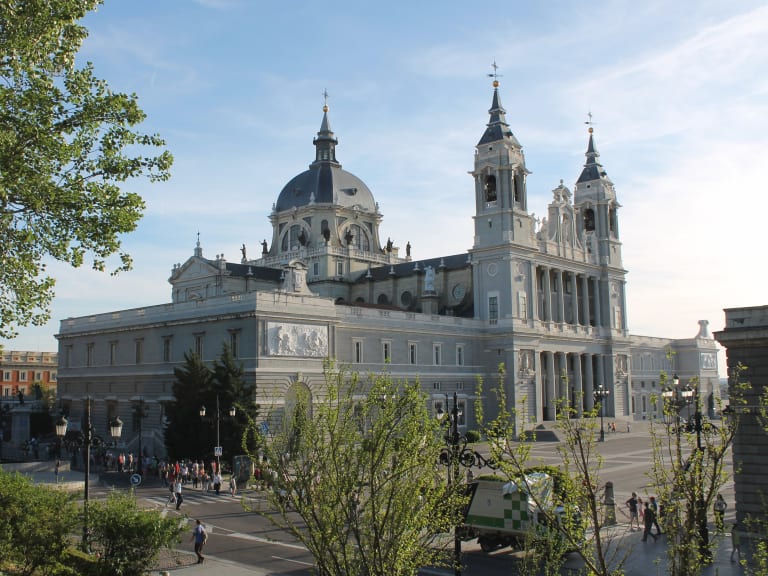
Madrid's most important church can be visited without having to pay an entrance fee. Its turbulent history, with several changes of project, has made its style quite eclectic and undefined, but it is still worth a visit.
Inside, the highlights are the altar of Santa María la Real de la Almudena, the Baptistery, the colourful stained glass windows and, above all, the crypt.
On a guided tour of the Almudena Cathedral you can also enter a museum which houses important religious and historical artefacts (admission is around €6 and includes a visit to the dome).
Don't miss a visit to the Royal Palace
A visit to Madrid's Royal Palace is almost essential when travelling to Madrid. Along with the nearby Sabatini Gardens (which you shouldn't miss either), it is one of the most important historical sites in the capital.
Before entering, take a look at the statues representing the Visigothic kings on display in the square where the palace is located.
The best way to visit the palace is to book a guided tour or, failing that, buy a skip-the-line ticket. Inside, as you can read in this article, you will be able to see various rooms of great interest, such as the official rooms, the Royal Armoury and the Royal Pharmacy.
The Plaza Mayor, the nerve centre of historic Madrid
After finishing your visit to the Royal Palace, you should head for Calle Mayor, which leads to the most famous place in historic Madrid: the Plaza Mayor. This large square is characterised by the atmosphere you will always find here. Its arcades are lined with restaurants and stalls selling stamps and other items, and I recommend you stroll around its perimeter at your leisure.
The square also has a large number of historic buildings (such as the Casa de la Panadería), several beautiful arches (such as the Cuchilleros arch) and a statue of Felipe II in its centre.
If you want something really typical, you can eat one of the famous squid sandwiches at one of the local restaurants in the square. If you prefer something else, the next stop on the route will satisfy your culinary tastes.
Grab a bite to eat at the Mercado de San Miguel
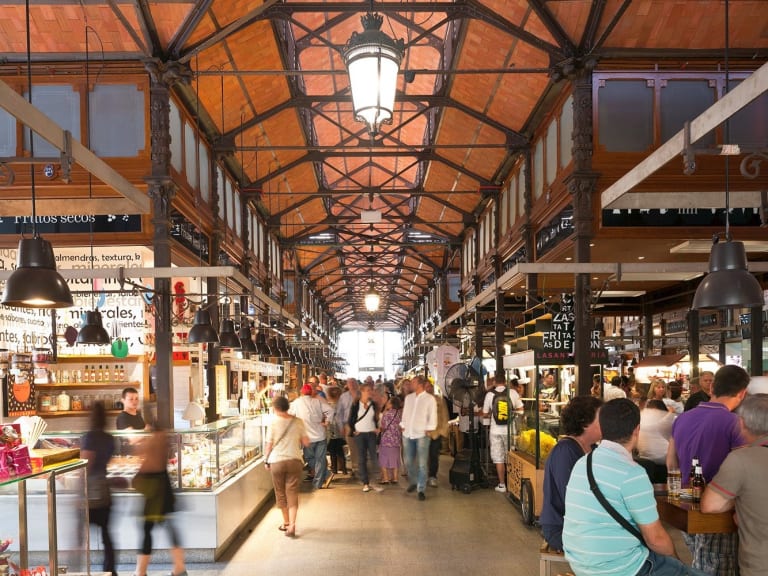
Close to the Plaza Mayor you will find what was the first gastronomic market in the city, the San Miguel Market. If you haven't been able to do a tapas and wine tour of Madrid, here you'll find some of the most typical ones, as well as more modern preparations.
The market is known for receiving high quality ingredients from all corners of the country. Once there, the dishes prepared with them are offered at its more than 60 stalls.
Feel at home in the centre of the country at Puerta del Sol.
I hope you've saved some room for dessert, because leaving the Plaza Mayor towards Puerta del Sol, I suggest you stop off at the San Ginés chocolate shop, one of the most traditional in the city. Although its star dish is churros with chocolate, you can always try one of its other specialities.
Then it's time to continue along Calle Mayor. A leisurely stroll will take you to one of the best-known places in Madrid, if only for appearing on television every 31 December during the chimes that welcome in the new year.
At the always busy Puerta del Sol, you can see the plaque that marks it as kilometre 0 of the country's roads, as well as another element that has become one of the best-known in the capital: the Tío Pepe advert. Of course, there is also the statue of the Bear and the Strawberry Tree, one of the symbols of the city. From Puerta del Sol you can access Calle Preciados, full of shops.
End the day on Gran Vía
The last destination on this first day is Gran Vía, one of Madrid's most important avenues. On this street you will see two well-known buildings, the Metrópolis and the Edificio Carrión, at the top of which there is a famous Schweppes sign.
However, the most characteristic feature of this street is its atmosphere. It is lined with restaurants, shops, cinemas and theatres. In fact, in recent years it has been nicknamed the Broadway of Madrid.
My suggestion is that, after strolling along this artery, you should go to one of the shows that are usually performed in its theatres. The most successful, at least in the last decade, are the musicals, and I'm sure you'll find one you like. Once the show is over, all you have to do is find somewhere to have dinner and retire to rest and get your strength back for the next day.
Day 2: Museums and parks
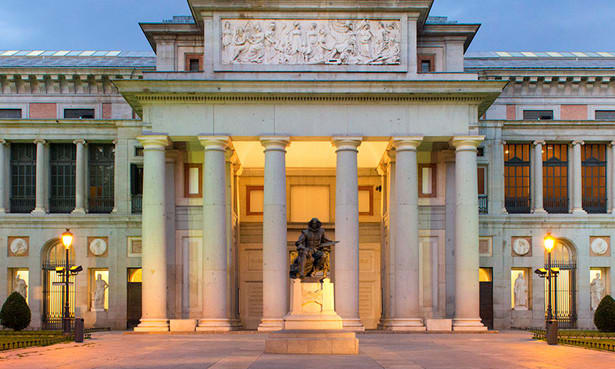
The second day in Madrid will, in principle, be less busy than the first. This does not mean that it will be less interesting or tiring, as it will begin with visits to two of the most important museums in the country. Then, in a more relaxed way, you can visit one of the most famous parks in the city.
Joaquín's Traveller Tip
A very good option to save money to get into the Prado and the Reina Sofía is to get a joint ticket that includes guided visits to both museums.
The wonders of the Prado Museum
Visiting the Prado Museum is an absolute must when travelling to Madrid. It is not in vain that it is one of the most important museums in the world, as the list of the best paintings housed in its facilities proves.
My recommendation is that you book your ticket to the Prado Museum as soon as possible. Although you can do it on your own, you can also consider booking a guided tour so that you can have a guide to take you to the most interesting areas and explain the works, which will save you time and, above all, allow you to enjoy the visit much more.
At the end of your visit, which won't take less than two and a half hours (if you go quickly), I recommend that you go to the Prado Museum shop and then recover some strength in a nearby café.
Reina Sofia Museum, another of Madrid's great museums.
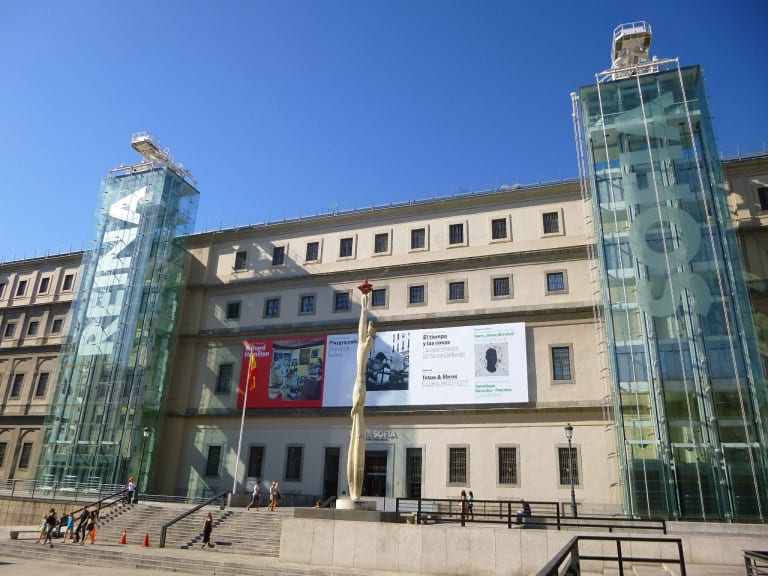
On the same street as the Prado is another of Madrid's most important museums. With a visit to the Reina Sofia you will be able to contemplate one of the largest collections of contemporary art in the world, with works by painters such as Picasso, Dalí and Miró.
To see the best works of the Reina Sofia Museum I recommend two options: buy tickets without queuing (if you want to see it on your own) or hire a guided tour to have the explanations of an expert.
Lunch and walk to Cibeles
The next thing to do on this day is to look around the restaurants near the Prado Museum for a bite to eat and relax from the busy morning. When you've finished, you can stroll along the Paseo del Prado towards Cibeles. On the way you'll see the Neptune Fountain and the spectacular Ritz Hotel.
In the Plaza de Cibeles you will be able to see the fountain with the statue of the Roman goddess that gives it its name. In the same area you can also see the Banco de España building and the palace of Cibeles.
The latter building houses a wonderful viewpoint with good views of the capital, as well as a bar on its terrace from which you can admire practically the same panoramic view. Entrance to the viewpoint costs around €3, while drinks at the terrace bar will be considerably more expensive (around €6 for a beer, for example).
Relaxing afternoon in the Retiro
The Retiro Park is the great green lung of Madrid and its 135 hectares are full of secrets to discover and street artists to enjoy. This large garden was opened in 1868 and attracts numerous tourists and locals every day. A good way to see the park is by bicycle, but you can also choose to explore its paths on foot at your leisure or book a tour of the Retiro.
Among the places not to be missed are the pond, theCrystal Palace, the monument to Alfonso XII, the Paseo de la Argentina, the Astronomical Observatory and the gate of Felipe IV.
Likewise, you can't go to the Retiro and not stroll through the Parterre gardens, full of exotic trees.
See the Puerta de Alcalá
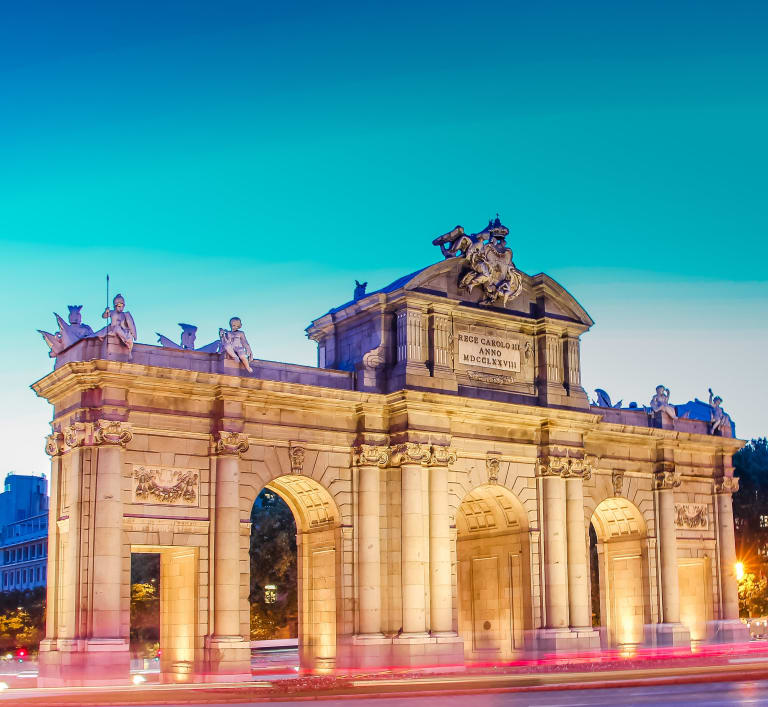
To leave the Retiro you should look for the exit closest to the Plaza de la Independencia. There you will find one of the five royal gates through which the city of Madrid was entered: the Puerta de Alcalá.
This triumphal arch has become a symbol of the city and was built during the reign of Charles III, nicknamed "the best mayor of Madrid" for his contribution to turning the city into a great metropolis.
Dinner in the Chamberí neighbourhood
To get to the next point on the route, the Chamberí neighbourhood, you can take a long walk or, more comfortably, use metro line 2. If you have time, as it closes at 8 p.m., it is very interesting to visit the museum created in the old Chamberí metro station This was closed in 1966, but was later restored and opened so that the public could see what this transport system was like at the beginning of the 20th century.
Another interesting building is Fire Station No. 1, the oldest in the city. It is worth taking a look at its neo-Mudejar style façade built at the beginning of the last century. You should not miss the Maudes palace either. This was once a hospital for day labourers and is now the headquarters of the regional Transport Department.
When you start to get hungry, all you have to do is choose from one of the many restaurants in the neighbourhood, such as Lacabia (c/ Alonso Cano, 84), Bizikletak (c/ Gaztambide) or ToriKey (c/ Rios Rosas).
3. Day Day trip to Toledo and Segovia
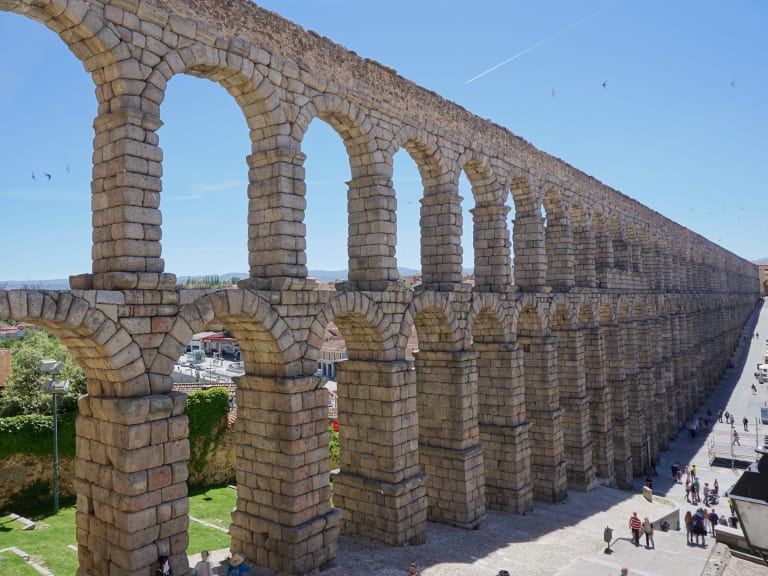
One of the great attractions of Madrid is its proximity and good communications with some cities of great beauty. For this third day I suggest that you take advantage of this to make an excursion to Toledo, a UNESCO World Heritage Site; book an excursion to Segovia, with all its great monuments, or you can even opt for the combo and book an excursion to Toledo, Avila and Segovia from Madrid
The old town of Toledo
The tour of this beautiful city usually begins in the Plaza de Zocodover, the ideal place to start wandering through the narrow streets of its historic centre. In total, you will spend about 3 hours visiting the attractions of the city of El Greco.
Accompanied by a guide who will explain the history of each of the corners of the city, you will then continue to the Primate Cathedral, which you can enter on your own during the free time you will have left at the end of the itinerary.
Discover the secrets of Segovia
With a 2,516-metre wall, 2,500 battlements and 87 towers, the city of Segovia is one of the most beautiful in the whole country. With this tour you will have 3 hours to explore it accompanied by an expert guide.
Its Gothic-style cathedral was built in the mid-16th century and is one of the essential visits for all those who come to this city. The same goes for the fantastic medieval Alcazar, declared a World Heritage Site by Unesco and whose entrance tickets are included in the price of the tour.
The city's most famous monument is, without a doubt, its splendid aqueduct, which, of course, is also part of this tour.
4. Day Trip to El Escorial and afternoon at Casa de Campo

For the fourth day of your stay in Madrid, my advice is to take a half-day trip to the nearby El Escorial Monastery. Later, you can enjoy a quiet afternoon in the Casa de Campo, a perfect place to spend a few hours if you've come to Madrid with children.
El Escorial Monastery: the eighth wonder of the world
If you want to take a guided tour of El Escorial, the most convenient way is to hire one of the tours that leave from the capital and not worry about buying tickets and other practical aspects. What's more, you'll have the advantage of being accompanied by an expert guide who will guide you and explain the history of the monastery during your visit.
The monastery, actually a monumental complex, was built to commemorate the Spanish victory at the Battle of San Quintín and to serve as a burial place for Spanish kings. Its enormous size was also an attempt to make it a symbol of Spain's power at the time.
The visit, which lasts about two hours, includes the Mausoleum of the Kings and Princes, the Chapter House, the basilica and the palace.
Reminisce the horror of war in the Valley of the Fallen
Before returning to Madrid, this excursion usually includes a visit to the Valley of the Fallen from Madrid, located 9 kilometres from El Escorial.
This site was built by the Franco regime with the intention of paying homage to the dead of the Spanish Civil War. Although controversial, the visit can help you to learn more about the historical moment in which it was built and its symbolism.
Casa de Campo

Back in Madrid, the itinerary continues through another of the city's great green areas: the Casa de Campo. There is no better way to get to this great park than by funicular railway. This means of transport, which departs from the Paseo Pintor Rosales station, covers 2.5 kilometres in eleven minutes and allows you to enjoy the beautiful landscapes of this area of the capital from the heights.
The Casa de Campo was built, like so many other parks, to serve as a place of recreation for the monarchy. Today, all its attractions have turned it into an area where many families spend their holidays, while tourists enjoy everything there is to see and do there. One of the great attractions is its artificial lake. If you feel like it, you can hire a boat for a quiet stroll or, for the more sporty ones, get into a canoe and paddle for a while.
Next to the lake is an entomological centre that will delight nature lovers with its more than 15,000 specimens of different types of butterflies and beetles. Another popular attraction, especially for those with children, is the Madrid Zoo, although it may not get more visitors than the nearby Parque de Atracciones.
Watch the sunset from the Temple of Debod
Back on the Paseo del Pintor Rosales you still have one last place to visit. Nearby is the Temple of Debod, an authentic Egyptian temple given to Spain in gratitude for its help in moving Abu Simbel.
As well as contemplating the temple, I recommend that you go to the nearby viewpoint to watch the sunset from there, as the views are well worth it.
Later, all you have to do is return to your hotel and look for a place to have dinner before retiring for the night.
Day 5: From the Bernabéu to remembering Madrid's "movida madrileña"
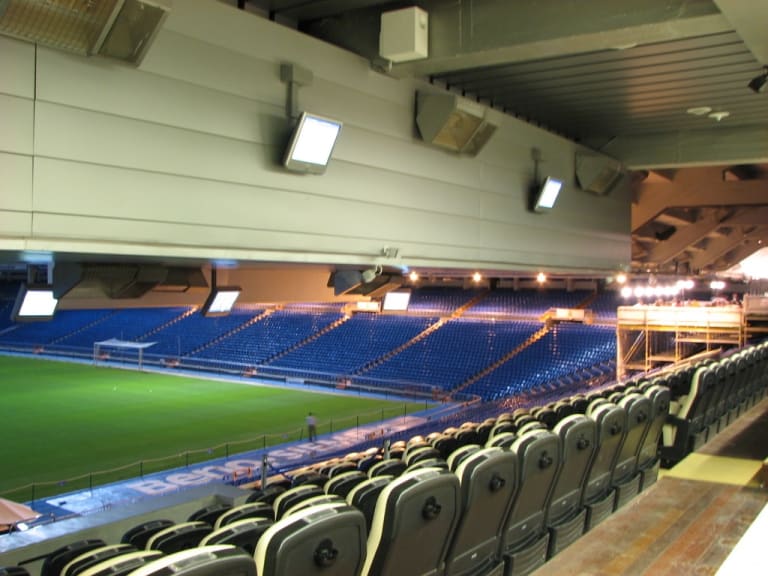
As you have seen, Madrid offers numerous plans and, to end your stay in Madrid, I have booked some visits that start in the most modern area of the capital.
At the end of the day, there's nothing better than experiencing some of Madrid' s vibrant nightlife in the area where the famous Movida was born.
If you are a football fan, don't miss a visit to the Santiago Bernabéu stadium
Although if you're not a football fan you can swap this visit for any other that takes your fancy, the success of the Bernabéu tour is demonstrated by its status as the third most visited museum in the whole city.
This makes it advisable to book your visit well in advance to avoid queues before entering. The tour includes exhibitions on the history of the club, as well as access to the dressing rooms, the dugouts and the presidential box, among other things.
The modernity of Plaza Castilla
Leaving the stadium you will find one of the most modern areas of the city. On your walk you will reach the Plaza de Castilla, surrounded by some of the most imposing skyscrapers in Madrid. The most famous buildings are undoubtedly the so-called Kio Towers, with their characteristic inclination.
In the square you will also find a monument built during the Franco regime, which partly follows the rules of typical fascist architecture.
Nearby is an obelisk by Santiago Calatrava, as well as a large cultural exhibition centre housed in a former underground water tank.
Experience the ambience of the Chueca neighbourhood

To get to the next point on the itinerary, it is best to take metro line 1 to the Tribunal stop. Just a few minutes away is the Chueca neighbourhood, one of the liveliest in the city.
The streets of this modern, commercial district are always full of life. Before wandering through it you can visit the Mercado de San Antón, where you'll find numerous food stalls spread over its three floors.
The neighbourhood, known for the glamour of its shops and cafés, is not lacking in some historic buildings that are worth seeing as you stroll through its streets. Although you are sure to find more, here are some of the most interesting ones:
- Museum of Romanticism: located inside a palace, this museum houses more than two thousand items from the 19th century. A good plan is to sit for a while in its cafeteria while you listen to the water falling from the fountain in the inner courtyard.
- Museum of the History of Madrid: although it is not very well known, this museum located in a former baroque-style hospice is perfect for those who want to delve into the history of the city.
- Church of San Antón: on Calle Hortaleza you will be able to see this interesting baroque church.
- La casa de las 7 chimeneas: the building is considered one of the best examples of 16th century architecture in Madrid. Located in Plaza del Rey, the legends about it are almost as interesting as its aesthetics. One of them, for example, claims that the 7 chimneys that give it its name are a representation of the seven deadly sins, while another story claims that an illegitimate daughter of Felipe II was imprisoned there and that her spirit still wanders its corridors.
Finish your visit to Madrid with one last tour
A stroll along Calle Fuencarral, one of the most commercial streets in Madrid, can help you to do some last-minute shopping. The street is full of fashion shops for young people, which gives it a great atmosphere all day long.
When night falls, I recommend you experience a bit of Madrid's nightlife. One option is to head for the area around Plaza Dos de Mayo, in Malasaña.
This area, considered to be one of the cradles of the popular Movida Madrileña of the 80s, is full of pubs and bars for all tastes. In many of them you will be able to enjoy live performances.




